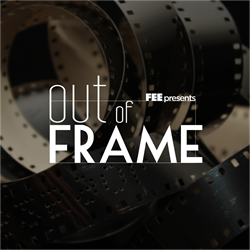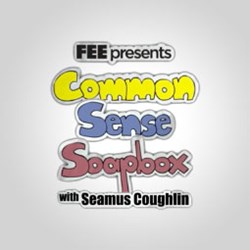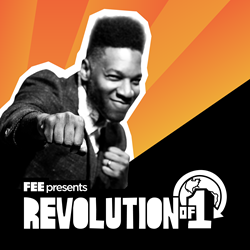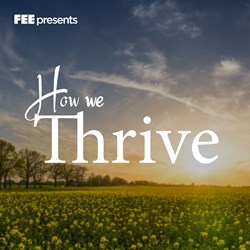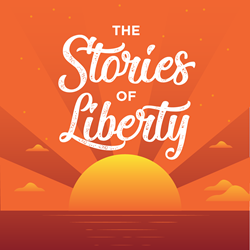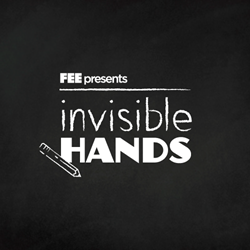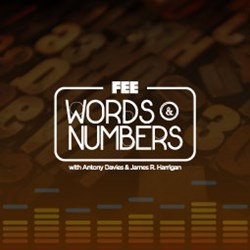INT. STUDIO - DAY
A young, energetic man, KEVIN LIEBER, stands in an open bright space behind an attractive desk, next to FIONA the puppet.
Pedestals and shelves are arranged behind them with a series of PROPS — a giant pencil, busts of important economists, globes and other common indicators of education & economics.
There are more objects relevant to economics on the desk.
We also see a small GREENSCREEN "blackboard" and an attractive ILLUMINATED SIGN with the Foundation for Economic Education logo on it.
SCENE 01: INTRODUCTION
We see a LOGO for "The Invisible Hands" on the blackboard.
KEVIN
(excitedly, to camera)
Hello, Kevin here! Welcome back to "Invisible Hands", the series that helps you understand economics.
(turning to Fiona)
Hey Fiona, here's a riddle.
FIONA
Okay!
KEVIN
It's something that everyone participates in everyday, but few people really understand. We get almost everything we need from it, but it's not a thing or a place. Can you guess what I'm talking about?
FIONA
Umm..... Ghosts?
KEVIN
(laughing)
Uh, no. Guess again.
PROFESSOR pops UP into frame.
PROFESSOR
I know! You're talking about MARKETS!
KEVIN nods at the Professor as FIONA enters.
FIONA
(interrupting sarcastically)
Hoooooold on! Markets? You're telling me that markets aren't a place?
KEVIN
Well... Ok, markets are also a place. But in economics, they're a process!
FIONA
That’s confusing.
KEVIN
Yeah, it is kinda confusing. Professor, help us out here.
SCENE 02: PROFESSOR FERGUSON EXPLAINS MARKETS
We see a new quote on the blackboard in the background. It reads:
"It is not from the benevolence of the butcher, the brewer, or the baker that we expect our dinner, but from their regard to their own interest."
― Adam Smith
PROFESSOR
Alright. Markets are the name we use to describe the complex network of voluntary exchanges between individuals in an economy. Every time you buy, sell, or trade with someone else, exchanging value for value, you're participating in the market.
FIONA
So, I can be part of the market even if I never leave the house.
PROFESSOR
Yes, but there's a lot more to markets than just buying & selling.
(beat)
Markets not only help increase wealth in society, they also transmit tons of important information about what people value, and they even promote trust and social cooperation.
FIONA
Really?
KEVIN
Markets sound pretty super!
(awkward pause)
Supermarkets?
(beat)
Get it? It's like a pun. Sort of?
Kevin looks to his co-hosts for approval.
KEVIN
No?
Fiona and Professor exchange looks and Professor continues his explanation.
PROFESSOR
Ugh...
(shaking his head)
Anyway, in order to understand how markets work, you've gotta understand a few things first.
KEVIN
That’s right.
SCENE 02: VOLUNTARY EXCHANGE
KEVIN
(to camera)
Voluntary exchange, gains from trade, specialization, division of labor, and emergent order.
Corresponding words pop on blackboard.
FIONA
Ugh. That sounds like a lot... Again!
PROFESSOR
Don't worry, it's all related and once you understand the basics, everything will make sense. Let's start with voluntary exchange.
KEVIN
That's really just another way of saying "trade", which we define as the act of freely and willingly exchanging goods or services―
PROFESSOR
(interrupting)
Or money!
KEVIN
―in return.
FIONA
That's simple enough. But why does it matter if trade is voluntary?
KEVIN
Remember how we talked about subjective value?
The previous video pops up on the blackboard, reminding the audience of that discussion.
FIONA
Yeah.
KEVIN
Voluntary exchange matters because it's the only way we can know how much the individual people involved actually value the goods or services they're trying to get.
FIONA
What do you mean?
KEVIN
Well, as long as people are free to say yes or no based on their own preferences, we know that when two people agree to trade with each other, both parties expect to benefit from the exchange.
FIONA
Why's that?
KEVIN
Otherwise, they wouldn't make the deal in the first place.
SCENE 03: GAINS FROM TRADE
A new quote appears on the blackboard. It reads:
"One of the most important ideas in all of economics is that trade creates wealth. It’s also one of the least understood ideas in all of economics."
― Art Carden
FIONA
Ohhhhhhhhhh! Duh. So when people agree to trade, you're saying that people choose to trade because both sides believe the trade will make them better off?
PROFESSOR
That's exactly right! Trade moves resources from people who value them less to people value them more. So, even when no new goods or services are produced, people can actually get wealthier just by trading with each other.
KEVIN
Like when you bought that pickle & pineapple pizza. You got the... weird... dinner you wanted, and the pizzeria got the money they wanted.
FIONA
It's a win-win!
PROFESSOR
Yes! That's true for individuals, and it's true for societies as a whole!
FIONA
Because society is made up of individuals, right?
KEVIN
(nodding)
Yep. But it gets even better!
(beat)
Trade encourages people to build trust and cooperate with each other. Some economists consider voluntary exchange the cornerstone of civil society. There's even evidence that trade between nations helps prevent war.
FIONA
That’s what you meant by "gains from trade", right?
KEVIN
Absolutely!
FIONA
Cool. But what happens if we force people to trade with each other?
KEVIN
We'll talk about this more in another video, but unfortunately we don't get all those benefits.
FIONA
Why not?
KEVIN
If we force people to trade with each other, their real values are being ignored. Forced exchange can actually make people worse off. Imagine how you'd feel if there was a new rule that said you had to buy the Professor’s paintings.
We briefly CUTAWAY to Professor Ferguson dressed up like Bob Ross, trying to paint a terrible rendition of a landscape.
FIONA
Ew! Gross!
KEVIN
But would you be better off?
FIONA
No!
SCENE 04: SPECIALIZATION IS GOOD
We see a quote from Henry Hazlitt on the blackboard. It reads:
“Specialisation encouraged innovation, because it encouraged the investment of time in a tool-making tool. That saved time, and prosperity is simply time saved, which is proportional to the division of labour.”
― Matt Ridley
KEVIN
When we force people to buy goods or services they don't want, or prevent them from getting the things that they do, we're actually making people poorer. It also means we're not really cooperating with each other or building trust.
PROFESSOR
When people try to plan or control the market, they're doing so at the expense of individual differences. And that's really important.
FIONA
I can see that. I certainly don't want anybody telling me what I'm supposed to like.
KEVIN
And there's even more to it than that! We all have tons of different skills, talents, and interests as individuals. We're all good at some things and not so good at doing other stuff.
FIONA
Like how I'm great at math, but really bad at cooking. And remembering to water plants.
We CUTAWAY gain. This time, we see a dead cactus. It explodes.
KEVIN
Exactly. Or like how the professor is good at economics, but terrible at painting.
PROFESSOR
Hey! I don’t really control my arms, here...
KEVIN
But all this diversity means that we're all way better off if we specialize in the things we're good at and trade with people who are good at the stuff we can't do.
SCENE 05: DIVISION OF LABOR
The TEXT on the blackboard changes.
"The greatest improvement in the productive powers of labor, and the greatest part of skill, dexterity, and judgment with which it is any where directed, or applied, seem to have been the effects of the division of labor."
― Adam Smith
PROFESSOR
That's right! Through specialization and cooperation through trade, we can create greater wealth than we could ever hope to achieve working in isolation. And the bigger the group we can trade with, the greater wealth we can generate for all!
FIONA
So you're saying I should get a job doing math, and hire a chef?
KEVIN
I've had your cooking, so... Please?
FIONA
(playfully offended)
Pff.
PROFESSOR
Don't feel bad, Kevin can't do math. I've graded his papers.
KEVIN
Hey!
PROFESSOR
What's really important to understand here is that division of labor makes us all wealthier and better off. It also allows us to create significantly more complex and complicated things.
FIONA
Like something as simple as a peanut butter and jelly sandwich… It would take tons of people with different skills to grind the flour, grow the fruit, pick the peanuts, and actually make all the stuff that goes into it!
PROFESSOR
Yes! When people specialize in doing the tasks they're best at, and trade with other people for all the things they can't produce as efficiently, our society ends up with increasingly better and more valuable goods & services made at increasingly lower cost.
(to camera)
We all win!
KEVIN
Plus, remember, more trade means more trust and cooperation with other people and...
FIONA
...that means more friends!
KEVIN
It sure does.
Kevin high-fives Fiona.
SCENE 06: SPONTANEOUS ORDER
New TEXT on the blackboard reads:
"To understand our civilisation, one must appreciate that the extended order resulted not from human design or intention but spontaneously"
― F.A. Hayek
KEVIN
A lot of people think that markets are just about competition, and while competition is always a reality in a world where resources are scarce and wants are unlimited, free markets are actually enormous networks of people cooperating with each other voluntarily.
FIONA
How so?
PROFESSOR
In an important sense, competition and cooperation are two sides of the same coin. In the market, people compete over ways to better serve others, in order to be more successful as entrepreneurs, business owners, employees.
(short pause)
The way to personal success in a market comes from finding out how to create value for other people.
FIONA
So competition in a free market economy is actually competition over who can serve other people the best.
KEVIN
That's right! But ya know what's even more amazing?
FIONA
Endless salad and bread sticks?
KEVIN
Well yes! But..... No.
(beat)
All of this happens without anyone actually planning, designing, or controlling the actions of people participating in the market, and yet order spontaneously emerges all the same.
PROFESSOR
Markets form, goods & services are produced, people get stuff they want & need in exchange for the things ― or money ― they value less. And it all happens because of individuals making their own plans and acting for their own self-interest. It's a logical order that just emerges from individual human action and isn't due to any kind of deliberate human planning or design.
FIONA
That is pretty incredible. It makes sense though. The same thing happens with language, right?
KEVIN
Yep! There's no one person or even a group of people in charge of all human language, and yet over thousands of years, individual people working in their own interests created a complex and highly structured communication system that works pretty good.
FIONA
Pretty well.
KEVIN
Oh... Yeah. Pretty well.
SCENE 07: MORE SPONTANEOUS ORDER & WRAP-UP
We see IMAGES on the blackboard corresponding to other instances of spontaneous order.
FIONA
I guess you can also see emergent order in all the other aspects of human culture, like art & music, dating customs, and the internet.
KEVIN
Definitely.
PROFESSOR
And for each of these examples, there's no mastermind at all! It's a common misconception that for order to exist in human society there has to be a central planner making decisions for everybody. In fact, history shows that attempts to centrally plan society result in chaos.
KEVIN
One key insight from the economist F.A. Hayek is that complex social orders are emergent and actually can't be centrally designed or controlled. He referred to the notion that the economy must be centrally planned as the “fatal conceit.”
FIONA
(gasps)
Fatal...
PROFESSOR
It’s just a metaphor… But ideas do have consequences. Understanding the emergent order that come from voluntary exchange is one of the most important insights we can learn from the economic way of thinking.
KEVIN
Adopting the the right ideas can help us create a society that works well for everyone.
FIONA
(pausing to think)
You know… Knowing that all of these amazing things can happen when individuals are free to create, dream, and make stuff on their own ― and to cooperate with other people to make a better world.
(thoughtfully)
It really is kind of beautiful.
KEVIN
Yes. It is.
PROFESSOR
I’d cry, but I have no tear ducts.
KEVIN
(turning to camera)
But what do you think? Do you understand the market process better? If you have questions or just want to know more, check out courses.FEE.org for tons of additional information.
(smiling)
See you next time!
About this show
Popular YouTube host Kevin Lieber (VSauce2) hosts this informative and entertaining video series designed to introduce key concepts of economics to younger audiences through credible arguments, comedy... And puppets!
